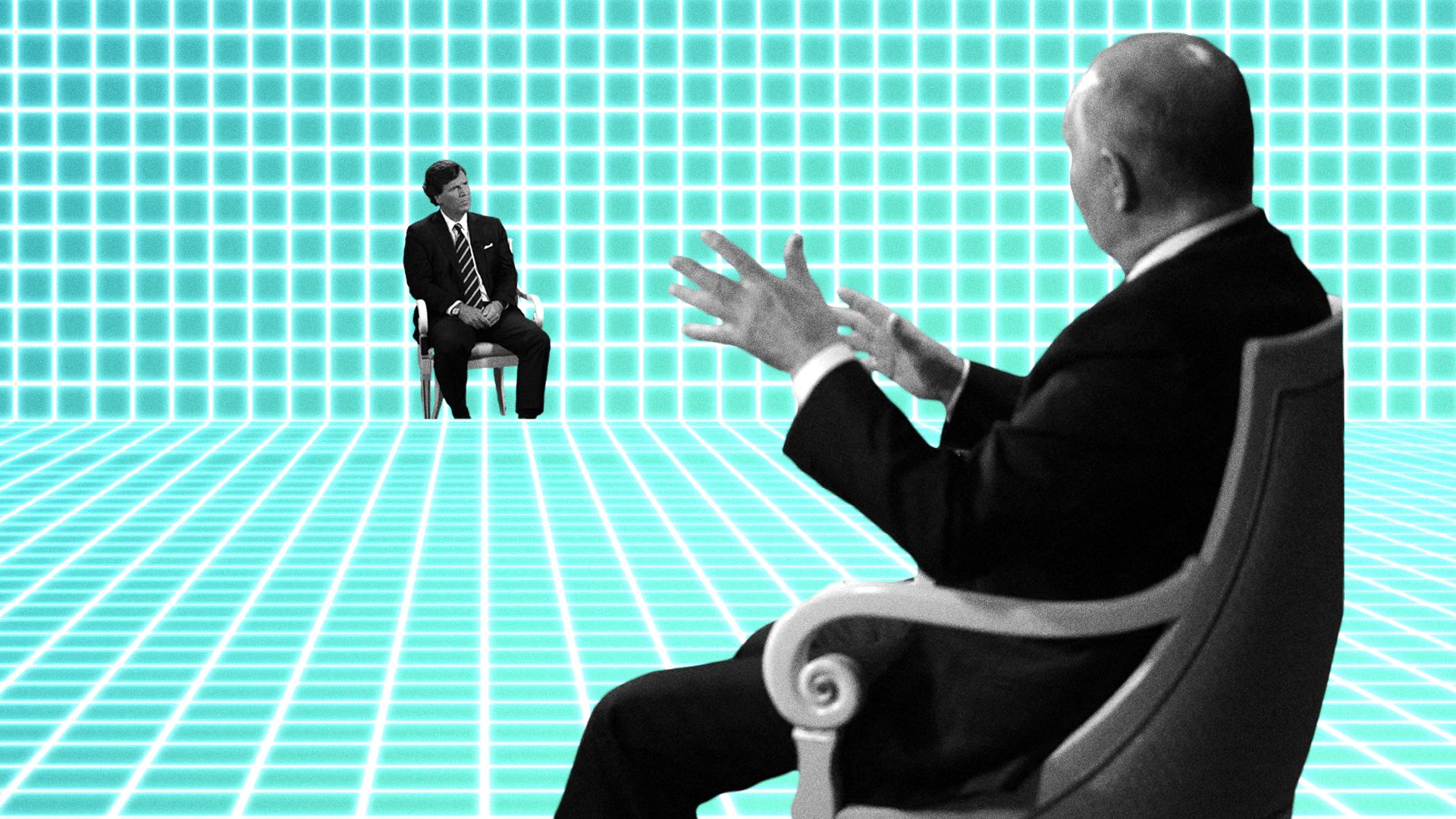When Tucker Carlson announced he was in Russia and was planning to interview Vladimir Putin – additionally claiming, falsely, that he was the only journalist who had even made an attempt to interview the Russian president – a predictable, if justified, wave of outrage ensued.
The reasons for outrage or indignation were manifold. Some were concerned Carlson would use the interview to push his own Trumpian talking points and agenda. Others were offended at his lie that more expert journalists hadn’t attempted to interview Putin. Still more noted that Wall Street Journal reporter Evan Gershkovich remains in a Russian jail on the flimsiest of pretexts.
Such was the indignation before the interview had even “aired” – since his departure from Fox News, Carlson no longer has a TV channel but instead broadcasts under his own brand on X, the site formerly known as Twitter – that Guy Verhofstadt even suggested the EU might consider sanctioning Carlson over it.
And then the interview was broadcast, and it became obvious very quickly that there is one thing people who cover dictators know that Tucker Carlson’s team evidently didn’t.
Dictators don’t have to be interesting. When you can force the state broadcasters to air your speeches at any length, and you can guarantee that you won’t be surprised by tough questioning, you start to bore on.
When a room will rapturously applaud even a monotonous two-, three-, or four-hour “speech” no matter what it says or how it is delivered, there is no need to make it good. Dictators tend to be very fond of the sound of their own voice, force their subordinates to fake an equal level of fondness, and so become outright boring.
At the start of what turned into a rambling two-hour interview, in which Carlson struggled to get more than a dozen words in at a time, he asked what seemed like a straightforward question: why did you invade Ukraine?
Without exaggeration, the answer took slightly longer than 30 minutes, and was nothing more than a rehash of a bizarre essay published by Putin two years ago, which – like his answer – begins in the ninth century and continues on a long historical ramble as to why Ukraine was never a nation and has always been part of Russia.
A feeble attempt to set the answer (and the interview) back on course after 15 minutes or so caused Putin to rebuke Carlson, saying that he might find his answer “boring”, but it was all-important. A clearly flustered Carlson replied meekly that “it’s not boring, I just don’t know how it’s relevant” – before being subjected to another endless rehashed history lesson.
Carlson is usually the king of any room he is in. He is an extremely experienced broadcaster and interviewer, who can – when he wants to – control and command a conversation. You would not have known that from this interview, in which he was clearly subservient to Putin and cowed by him.
Despite his efforts to look attentive and in control, Carlson’s boredom and frustration was visible on his face. Putin seemed to notice and enjoy that, but gave him nothing in return. Carlson tried to push talking points useful to Trump and those in Trumpland – had Nato provoked him into invading Ukraine, he asked hopefully, only to have the prompt ignored.
No facts were challenged, no evidence of massacres was presented, though Gershkovich’s case got a fleeting mention when Carlson asked if he might release him as a gesture of goodwill – only to be told that Russia’s (and by extention Putin’s) goodwill had run out. Carlson doesn’t speak Russian and has no reporting expertise on the country – making him an ideal foil for a Russian president who wanted to be able to steamroll a western interview.
The one act of mercy Putin threw Carlson’s way was bringing the interview to an end after two-and-a-bit hours – though generally it is the host rather than the guest that ends a broadcast.
Dictators can safely be boring, but one thing in Carlson’s favour is that he can afford to be boring these days, too. Twitter’s metrics show up a “view” for each time the post containing a video comes on to someone’s screen, however briefly that is the case and however many times it is being seen by the same person.
Thanks to that, Carlson can boast an impressive 123m views for his interview already – more people than watch the Super Bowl – even though the overwhelming majority of those will have watched absolutely none of the interview.
It seems vanishingly unlikely that either Carlson or Elon Musk, X’s owner, will release figures as to how many people watched the video in full (or even a total number of minutes viewed), but even the most hardcore fan would struggle to watch more than a few minutes.
No one comes out of this whole debacle all that well. Verhofstadt managed to make the EU look foolish by virtue of threatening free expression when there was no justifiable reason to call for sanctions before the broadcast. Taking action against something passing as US media for an interview would give Carlson and his mob fodder for years.
Carlson comes out of the interview looking weak and ineffectual, which will clearly sting a man with a significant ego and a desire to be the top dog. Given that Carlson is rumoured to be angling for a position in Trump’s second cabinet (should he get one), he has not done much to advance that – Putin serves his own agenda, never anyone else’s.
As for Putin, it’s not really clear what he gets out of it other than a bit of personal validation: this interview won’t reach many people outside Russia, and it’s not going to change the mind of anyone who watches it.
Most of those who do watch it will just turn off, finding him tedious, but those who cut through will see one thing extra. When Putin dismisses the west, or rages against it, he does so in the way a man denounces his ex-lover, with the venom that only comes from being jilted. Like many Russian leaders, Putin clearly wanted the west to see more in him than it does – and that bitterness just makes it easier to see him as he is: a small man, getting older, and getting frailer.




